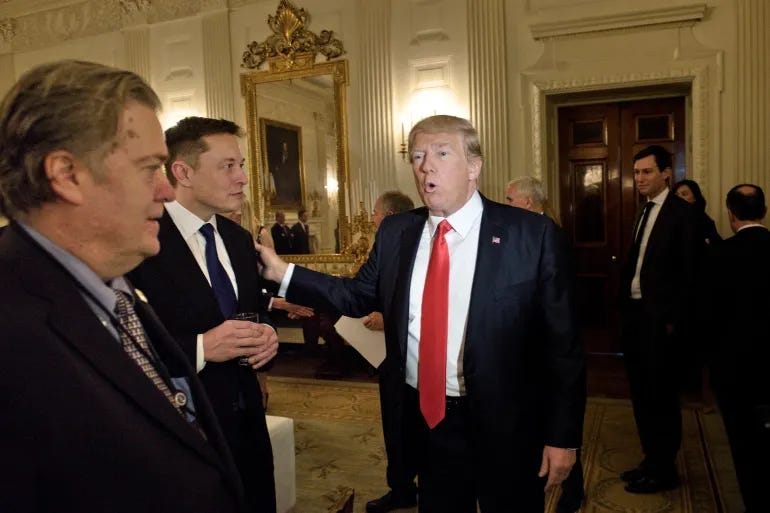H-1B Visa Holders: Who They Are and What’s at Stake
Tech Allies Clash with MAGA Over Immigration Policy
As Donald Trump prepares to assume office once again, a sharp divide has emerged within his camp over the controversial H-1B visa program. This rift pits some of his key tech allies, including Elon Musk and Vivek Ramaswamy, against staunch MAGA proponents like Steve Bannon, who argue that the program undermines American workers.
Former White House strategist Steve Bannon has accused Musk of fostering “techno-feudalism on a global scale,” slamming the billionaire for supporting the hiring of skilled foreign workers. Bannon’s criticism aligns with broader concerns among Trump’s far-right base, who view the visa program as detrimental to domestic job opportunities. Meanwhile, Ramaswamy, a prominent entrepreneur and Trump’s pick for leading government spending cuts, has also defended the need for trained foreign professionals—albeit with a call for reforms.
Following backlash from MAGA supporters, both Musk and Ramaswamy have adjusted their stance, advocating for changes to the program rather than outright support.
Trump’s Shifting Stance on H-1B Visas
The H-1B visa, a temporary, non-immigrant work permit, allows U.S. companies to employ highly skilled professionals from overseas. Originally introduced under President George H.W. Bush, the program has been a focal point of Trump’s shifting immigration policies.
During his 2016 campaign, Trump denounced H-1B visas as “very, very bad” for American workers. In 2020, he even imposed a temporary ban on the program, a decision later overturned by a federal court. However, in a surprising reversal, the president-elect has recently praised the visa system, declaring, “It’s a great program,” and acknowledging his reliance on H-1B workers within his own businesses.
Balancing Big Tech and MAGA Loyalty
Musk’s relationship with Trump has been instrumental in shaping the political landscape. The Tesla CEO contributed significantly to Trump’s campaign and used his platform, X (formerly Twitter), to amplify MAGA viewpoints. Yet, despite Musk’s influence, Trump has sought to downplay his sway, clarifying, “No, he’s not taking the presidency,” in a December speech.
As Trump navigates his second term, he faces the challenge of balancing the interests of Silicon Valley executives—who play a crucial role in economic growth—and the demands of his staunch MAGA base.
The H-1B Visa and Its Major Beneficiaries
Jeanne Batalova, a senior policy analyst at the Migration Policy Institute, describes the H-1B program as “the largest temporary work visa program” in the U.S. With an annual cap of 65,000 visas, plus an additional 20,000 reserved for advanced degree holders, the program employs a lottery system when applications exceed the limit.
Eligible workers must be employed in specialized fields requiring at least a bachelor’s degree. Industries such as information technology, medicine, and engineering dominate the program, with major beneficiaries including Amazon, IBM, Microsoft, Google, and Meta. Indian tech giants Infosys, TCS, and HCL also secure a significant share of these visas.
Notably, Tesla has emerged as a major recipient, securing 742 new H-1B visas in 2024—more than double its 2023 count.
The Ongoing Debate Over H-1B Visas
Tensions flared further when far-right activist Laura Loomer criticized Trump’s appointment of AI expert Sriram Krishnan, who has advocated for expanding skilled foreign worker programs. Musk responded by declaring he would “go to war” over the issue, citing his own experience as a former H-1B visa holder before becoming a naturalized U.S. citizen.
Ramaswamy also weighed in, linking the hiring of foreign-born workers to cultural disparities in America’s education system. However, he later clarified that while the H-1B program is flawed, it should be reformed rather than abolished.
Criticism from Both Sides of the Aisle
While MAGA figures like Bannon decry the H-1B program as a mechanism for importing cheap labor, criticism has also come from Democratic lawmakers. Representative Ro Khanna has argued for reform, stating, “You can’t underpay these H-1B folks coming in… The program should really be for exceptional talent.” Senator Bernie Sanders has echoed these concerns, accusing the system of displacing American workers.
The Future of H-1B Under Trump’s Second Term
With Trump poised for another term, uncertainty looms over the fate of the H-1B visa program. Ron Hira, a political science professor at Howard University, notes that despite Trump’s past promises to reform the system, no action was taken during his first term. Now, with full Republican control over Congress, the possibility of change remains, though political calculations will ultimately dictate the outcome.


